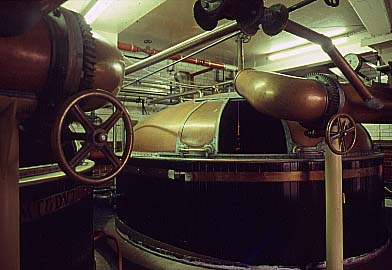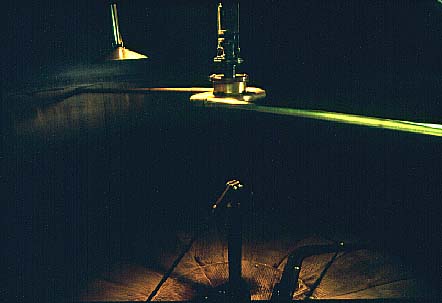Samuel Smith's Brewery Tour - Page 2

These are the mash tuns. This is where the grain and water mixture goes
through several chemical reactions in which enzymes in the malt convert
starches to sugars and break complex proteins into smaller proteins and
amino acids. After this "mashing" process is complete, the
spent grain is separated from the sweet liquid which is now called "wort" (pronounced
WERT). Just above the two "wheels" in this photo, are what's
called "Steel's Mashers." These devices mix crushed
malt (that pours down from the malt mills on the floor above through what
is called the "grist case," one of which can be seen in
the very top right corner of this photo) with water (called "liquor" by
brewers) and make sure there are no dry pockets in the malt.

This is a view inside an empty mash tun. Although they are difficult to
see, there are slots in the floor of this tun through which the wort runs
out. The slotted "false bottom" holds back the husks and other
insoluble parts of the malts and other grains (like oatmeal). The two long
pipes near the top of the tun slowly rotate as they sprinkle water on the
grains, rinsing out trapped sugars (this is called "sparging").
The barely visible arms at the bottom of the tun are used for removing
the spent grain (they are not run during the mash or sparge). In case you're
curious, the triangular device near the top of the tun is simply a light.
Back to Page 1 |
Next Page on the Tour
Back To
the BrewInfo Page (Home)
Copyright © 1997 Al Korzonas - All Rights Reserved

